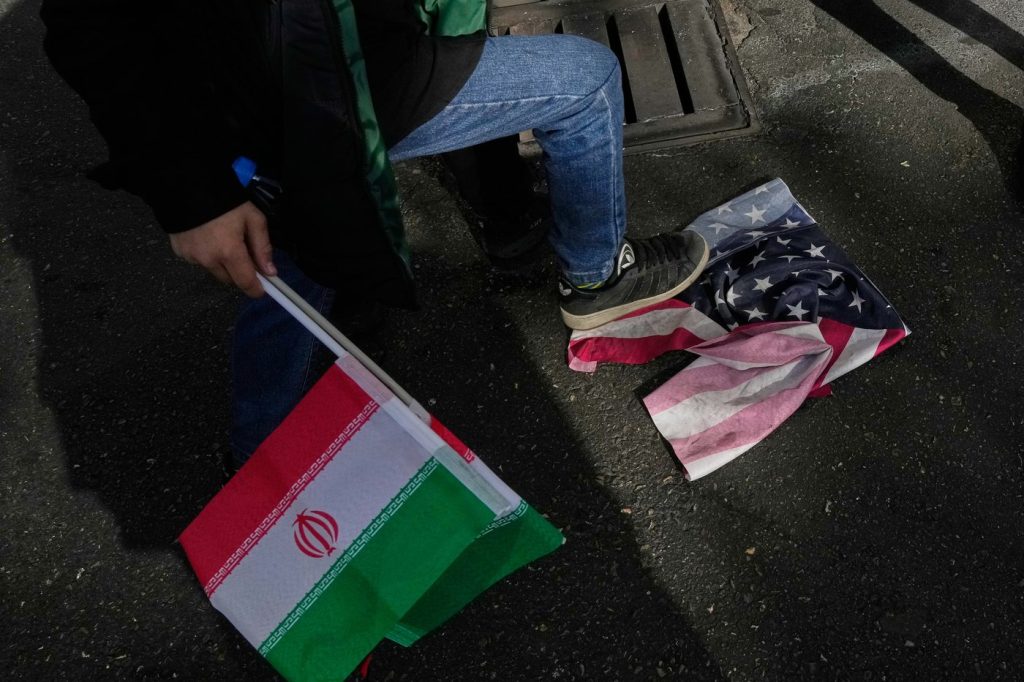TEHRAN, Iran (AP) – On November 4, 2025, thousands of Iranians gathered in downtown Tehran to mark the anniversary of the 1979 takeover of the U.S. Embassy. This year's commemoration was particularly significant as it was the first since the recent U.S. airstrikes targeting Iran's nuclear facilities during a 12-day conflict with Israel that occurred in June. The embassy takeover involved Iranian students who stormed the location and held 52 American hostages for 444 days, fundamentally altering Iran-U.S. relations.
During the rally, participants chanted slogans such as “death to America” and “death to Israel,” with some individuals hanging effigies of former U.S. President Donald Trump and Israeli Prime Minister Benjamin Netanyahu. Attendees also burned U.S. and Israeli flags, reinforcing the anti-American and anti-Israeli sentiment prevalent at the event. State media reported similar demonstrations occurring in various cities and towns across Iran.
Notably, the rallies included displays of mock-ups of Iranian missiles inscribed with messages such as “death to America.” Additionally, replicas of the centrifuge machines that are used in uranium enrichment were showcased. The ongoing tensions between Iran and the West were underscored by statements from Iran's supreme leader, Ayatollah Ali Khamenei, who reaffirmed that there would be no move towards normalizing relations with Washington anytime soon, a sentiment echoed by banners at the rally.
The backdrop to this year's commemoration was the violent conflict with Israel in June, which saw nearly 1,100 Iranians, including both military commanders and nuclear scientists, killed due to Israeli airstrikes. The conflict also involved the U.S.'s bombing of Iranian nuclear sites, prompting a retaliatory missile strike from Iran that resulted in 28 fatalities in Israel. Following the military confrontation, five rounds of contentious talks between Iran and the U.S. regarding Iran's nuclear ambitions had taken place without achieving resolution.
Parliament speaker Mohammad Bagher Qalibaf delivered a key address at the rally, accusing the U.S. and Israel of targeting Iranian scientists in an effort to undermine Iran's sovereignty and independence. He labeled the former U.S. embassy a “den of spies,” reflecting the longstanding animosity between the two nations that has persisted since the hostage crisis in 1979.
Furthermore, Iran has decreased its cooperation with the International Atomic Energy Agency (IAEA) following the escalation of conflict with Israel. Currently, Iran possesses a stockpile of uranium enriched up to 60% purity, just a technical step away from weapons-grade levels of 90%, which could potentially be used to develop several nuclear weapons if Tehran chooses to pursue this path. While Iran insists that its nuclear program is solely peaceful in nature, Western nations and the IAEA maintain that Iran operated an organized weapons program until 2003.
In September 2025, the United Nations imposed new sanctions on Iran related to its nuclear program, tightening the already strict limitations on the Islamic Republic. These sanctions led to the freezing of Iranian assets abroad, halted arms transactions, and threatened punitive measures against developments in Iran's ballistic missile program.











